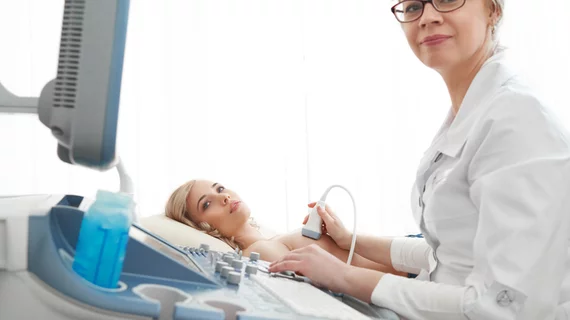Ultrasound scanners backed by artificial intelligence can help radiologists to better triage patients and reduce unnecessary breast cancer care costs, according to a new study published Tuesday.
Breast lumps are often discovered accidentally during self-exam or assessment by a medical provider. Organized mammography screening programs can determine whether the concern may be cancerous. However, some in remote or low-income areas may lack access to such technology, leading to potential delays in diagnosis and worse outcomes, experts wrote in Radiology.
Researchers recently tested the use of low-cost ultrasound scanners to address this potential care gap. The prospective analysis found encouraging early returns, with AI correctly identifying 96%-98% of women with cancer.
“Our results show great promise for the use of AI and portable ultrasound in low-resource settings, including remote/underserved areas in the United States, to help improve breast healthcare,” lead author Wendie A. Berg, MD, PhD, a professor of radiology at the University of Pittsburgh, said in an announcement. “In reducing the number of women with benign lumps who need to be seen in central facilities and potentially have a biopsy, healthcare resources can be better focused on women with cancer and reduce delays in diagnosis.”
For the analysis, radiologists examined participants with at least one palpable mass who had enrolled in the study at a Jalisco, Mexico, hospital between 2017-2021. The final sample included 758 masses in 300 women, who were an average age of 50. AI technology from Koios Medical processed each scan without any human intervention. Women were imaged using both standard ultrasound, along with a low-cost, portable version of the technology
AI was able to correctly 96% percent of women with cancer using the portable ultrasound versus 98% among the standard images.
“Although specificity was less than with standard-of-care equipment, AI applied to portable breast US can potentially reduce about half of unnecessary referrals for benign lesions in resource-limited regions,” Berg et al. concluded. “These favorable results were observed despite lack of training of the AI software with images from the device used, and current portable US has improved specifications,” they added.
Read much more about the results in the flagship journal of the Radiological Society of North America below.

